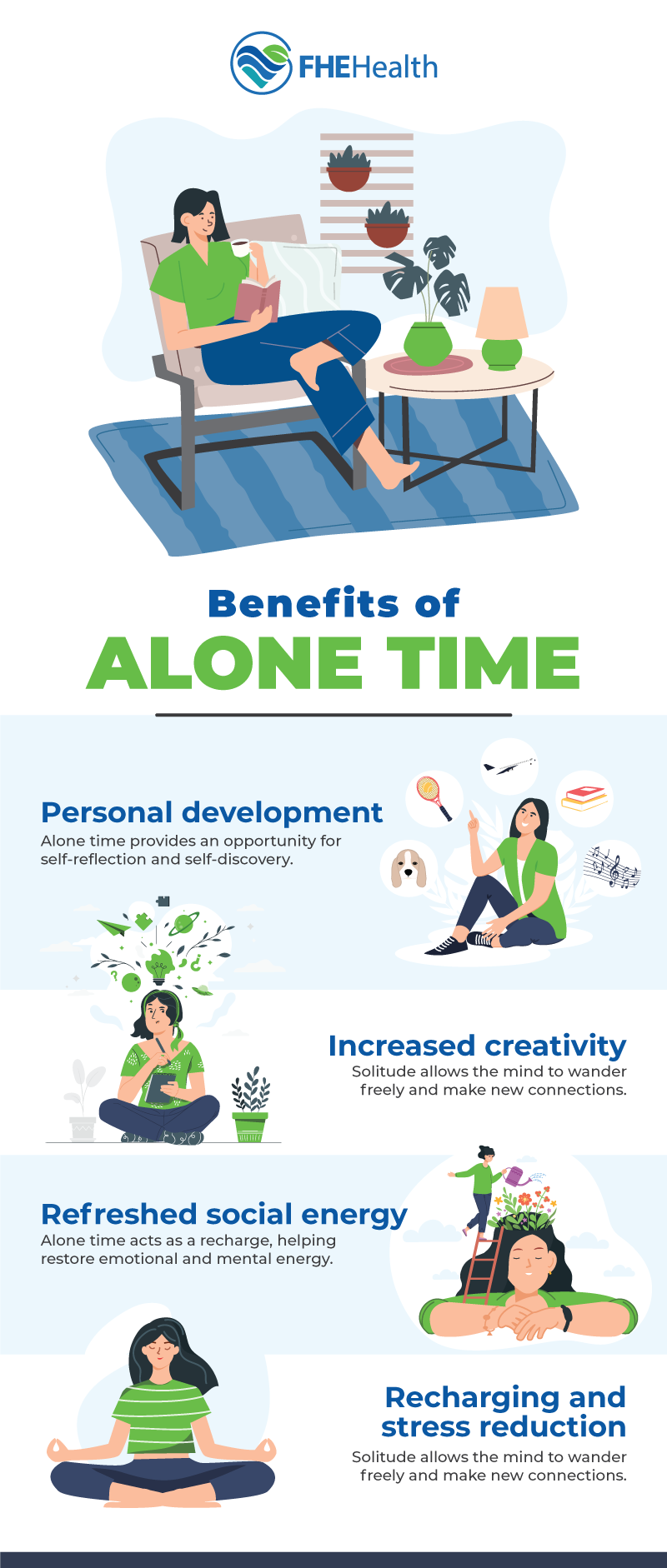
A lot of attention is given to the negative impacts of isolation on mental health, but it’s also possible to struggle as a result of too little alone time. Everyone needs some time on their own to rest and reflect. Alone time is crucial for mental health and well-being, playing a pivotal role in personal development, fostering creativity and recharging your social energy. In our fast-paced and interconnected world, carving out moments for solitude has become increasingly challenging, but the benefits of doing so are substantial. Let’s take a look at the significance of alone time for mental health.
Recognizing the Significance of Alone Time
In a world that celebrates constant interaction and stimulation, the value of being alone with your thoughts and emotions is frequently overlooked. The significance of alone time is underscored by its capacity to act as a sanctuary for self-reflection, personal growth and creativity. Recognizing and challenging this underappreciation is a crucial step toward fostering a more balanced and resilient approach to well-being.
Mental Health Benefits of Solitude
Solitude offers many mental health benefits when it’s practiced in a healthy and balanced way. Here are some positive impacts people may experience when they begin to prioritize alone time.
1. Personal Development
Alone time provides an opportunity for self-reflection and self-discovery. It allows individuals to explore their thoughts, values and goals without external influences. Engaging in activities like journaling, meditation or goal setting during alone time can contribute to personal growth.
2. Increased Creativity
Solitude allows the mind to wander freely and make new connections. Many creative breakthroughs occur during moments of quiet contemplation. Artists, writers and innovators often rely on alone time to tap into their creative potential and generate fresh ideas.
3. Refreshed Social Energy
While social interactions are essential, they can be draining for some individuals. Alone time acts as a recharge, helping restore emotional and mental energy. Spending time alone allows people to return to social situations with renewed enthusiasm and a clearer perspective.
4. Recharging and Stress Reduction
In the midst of life’s relentless demands, the opportunity to step away and immerse yourself in solitude becomes a crucial antidote to the pressures of daily stressors. During these moments of seclusion, individuals can disengage from external stimuli, allowing their minds to recalibrate and recharge.
This deliberate withdrawal offers a chance to release accumulated tension, fostering a sense of relaxation and tranquility. Whether through activities like meditation, a leisurely walk or simply enjoying quiet moments, alone time becomes a sanctuary for mental rejuvenation, providing a valuable buffer against the challenges of a fast-paced and stress-laden world.
Challenges and Struggles of Getting Enough Alone Time
Although alone time is essential for every human, many people struggle to schedule enough of it in their daily lives. The challenges of getting enough alone time include practical issues as well as complicated feelings about being alone in our hyper-connected society.
1. Busy Lifestyles
Modern life often emphasizes constant connectivity and productivity, leaving little room for solitude. Balancing work, social commitments and personal time is a common challenge.
2. Fear of Loneliness
Some people associate being alone with loneliness, leading to a reluctance to spend time in solitude. While loneliness is certainly a problem in our society — 58% of Americans report feeling lonely — it’s not the same thing as taking time for yourself. Cultivating a positive relationship with yourself and reframing the perception of alone time can help overcome this fear.
3. Stigma of Being Alone
Some people are afraid that spending time alone will reflect badly on them. They may not want to be seen in public on their own, as they worry that people may think they have no friends. Research shows that many people feel like they can’t take part in activities they enjoy alone, particularly if they’ll be observed by others while doing so. Concerns about appearing unfriendly or aloof also hold people back from scheduling the alone time they need.
Balancing Social Interaction and Personal Space
The optimal amount of alone time varies from person to person. It depends on individual preferences, personality types and external demands. Regularly assessing your mental and emotional state can guide you in determining the right balance for your well-being.
Introverts and Extroverts
Introverted individuals generally require more alone time to recharge, while extroverts may find social interactions more energizing. Recognizing and respecting these differences within relationships is crucial for harmony.
Signs of Needing Alone Time
Signs you’re in need of some alone time include feeling irritable and having increased stress levels or feeling overwhelmed or fatigued. You may also experience difficulty concentrating or making decisions.
Incorporating Alone Time Into Self-Care Practices
For many people, alone time happens only if they make the effort to schedule it as part of their regular self-care practices. Here are a few ways to ensure you get the alone time you need.
- Schedule alone time. Block out specific times for yourself on your calendar.
- Communicate your needs. Let friends and family know you need this time to yourself to recharge and that it’s not a negative reflection on your relationship with them. Explain the positive impact of alone time on your mental health and well-being.
- Create a designated space for solitude. Choose a room in your home where, at certain times of day, you can go to be alone without being disturbed.
- Establish boundaries. Set clear boundaries to protect your alone time, such as turning off electronic notifications.
Alone time is a valuable investment in mental health. Recognizing its benefits, understanding personal needs and effectively incorporating it into a busy lifestyle are essential components of a holistic approach to well-being. Striking a balance between social interactions and solitude contributes to a more fulfilling and resilient mental state.
If you’re concerned you may be suffering as a result of an inability to establish boundaries to protect your alone time, contact us at FHE to find out more about our programs. By reaching out to us today, you can speak with a mental health practitioner who can help you find a healthier balance between social activities and alone time.







